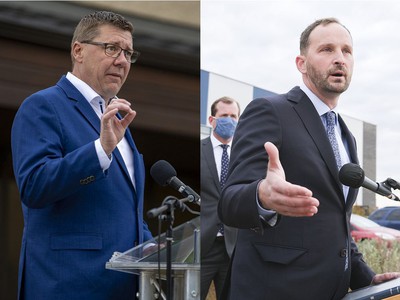
Jobs, classroom sizes, mental health treatment and COVID-19 dominated discussion as the leaders of -Saskatchewan’s two largest political parties met for a socially-distanced debate in Regina on Wednesday.
Saskatchewan Party leader Scott Moe spent most of the debate emphasizing accountability, saying voters were looking for a party they could trust to handle the province’s economic recovery. NDP leader Ryan Meili countered by touting his party’s investment commitments in areas like health care and education, and promised tax rates would not go up for ordinary families under an NDP government.
“Our plan (is) to invest now, get our economy moving again, and help people out in this difficult time,” Meili said during his opening remarks. “Even before the pandemic, people were having a harder time in Saskatchewan.”
“We all remember the NDP’s record of decline,” Moe said during his own opening two-minute speech. “They’re a risk we can’t afford. The Saskatchewan Party has a plan for a strong recovery and a strong Saskatchewan.”
The two leaders opened by sparring over the province’s COVID-19 response. When asked if they would support a mandatory indoor mask policy, Moe said it was unnecessary as long as residents maintained proper social distancing. Meili countered by saying there were too many instances, like classrooms, where residents have little opportunity to maintain a proper buffer.
“We’ve been clear since day one–when you are able to create that physical distance … a mask is not necessary,” Moe said. “We’ve been very clear on the masking policy that we have had in this province. It has been effective, and it will continue for the foreseeable future.”
“When we’re talking about what’s the biggest risk right now, we’re talking about gatherings,” Meili countered. “Class sizes are very germane to this conversation.”
The NDP leader frequently criticized Moe for his government’s spending priorities, saying they weren’t doing enough to help ordinary people. Meili pointed to the NDP’s plan to raise the minimum wage to $15/hr as a sign his party wanted to help low-income working families. He repeatedly asked Moe why Saskatchewan workers didn’t deserve more for their labour.
Moe responded by saying his party has made life more affordable for low-income residents by raising the amount of income they can earn before having to pay income tax, and increasing personal tax exemptions. Moe said he was proud of his party’s record when it came to making Saskatchewan a cheaper place to live and do business.
The Saskatchewan Party leader got his own shots in on the NDP, saying the party had no plans to balance the budget, and wouldn’t be able to meet their spending commitments without raising taxes. The NDP has committed to spending $150-million on hiring more than 1,000 health care professionals, and $125-million on hiring 1,000 teachers, 750 educational assistants and 400 caretakes to reduce overcrowding in Saskatchewan classrooms.
They also committed to building a new bridge and new hospital in Prince Albert during a campaign stop in September, and pledged $10-million to create a provincial mental health and addictions strategy. Their platform includes a one per cent wealth tax on anyone with a net worth of more than $15-million.
When asked by debate moderator Molly Thomas how an NDP government would pay for its commitments, Meili said major tax increases were not part of the plan.
“We will not raise taxes for ordinary families by a single cent,” Meili said. “The only increase that we are committed to is asking those very few families, those folks with over $15-million free and clear in assets, to pay a little bit more.”
The provincial government’s relationship with Indigenous communities was also front and centre during the debate. The two leaders pledged to open the lines of communication with Indigenous leader, but a heated exchange on how best to respond to the suicide crisis in Northern Saskatchewan.
Meili criticized Moe for how he handled Tristen Durocher’s 44-day fast in front of the legislature. Durocher walked 635 km to Regina to protest the government’s decision to vote down a suicide prevention bill put forward by the NDP, and Meili said the government missed an opportunity by filing a court injunction against him instead of holding a meeting.
Moe responded by saying senior members of government happily met with Durocher, and argued that the NDP bill wasn’t necessary to tackle the province’s mental health problem.
The 2020-21 provincial budget included $435-million for mental health and addictions support services–a $30-million increase from the year before. The government also created the Pillars for Life Strategy in April, with includes a letter of commitment with the FSIN and federal government to decrease suicides in the north.
“This is a plan, a strategy that needs to be invested in in the years ahead, and it will be,” Moe said.
Meili countered by saying the wait times for mental health and addictions services were too long, which hindered Saskatchewan residents from seeking treatment. He said the NDP plan to hire hundreds of new health care professionals would help solve the problem.
Both candidates also spoke briefly about the new safe injection site that opened earlier this year in Saskatoon. It’s the first of its kind in Saskatchewan, and it was built without government funding.
When asked if the government would financially support future safe injection sites, Moe said they would consider it, but were looking at all options. Meili said his party is committed to harm reduction policies, as well as investments in addictions prevention, assessment and treatment programs.
The provincial election is scheduled for Oct. 26.

